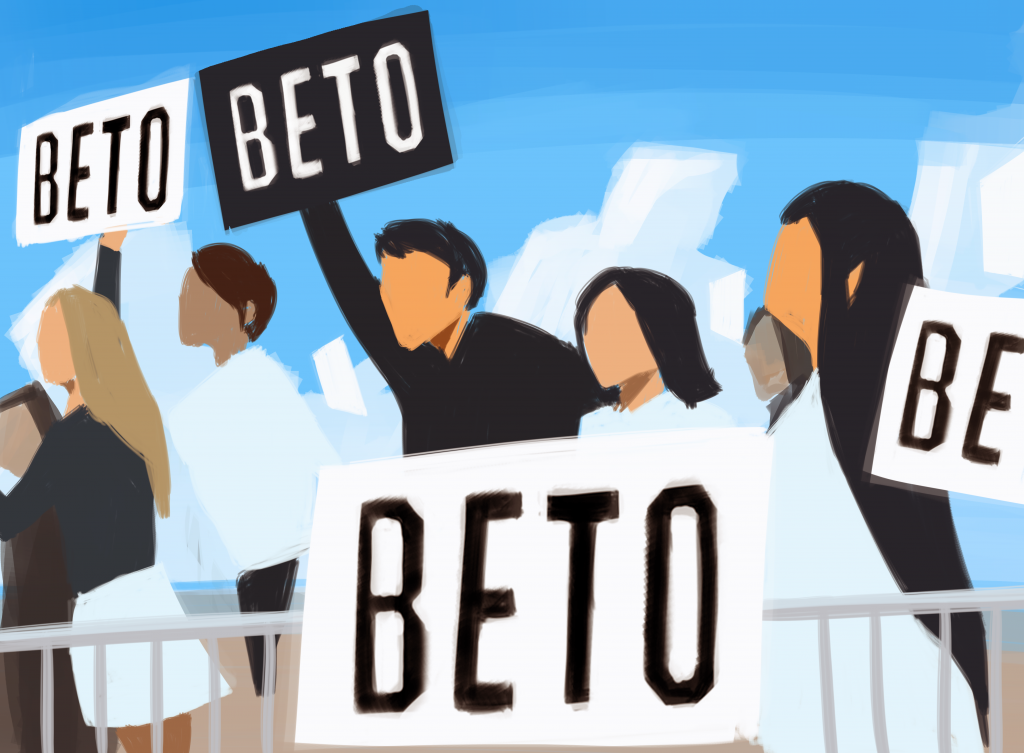

In March 2017, Beto O’Rourke was hardly Oval Office material. He was a no-name congressman from El Paso rounding out his third term in the House of Representatives. He was a young moderate on two standing committees and with relatively few legislative achievements to his name. He was a Democrat who had been comfortably elected to represent a reliably blue district near the El Paso/Ciudad Juarez border. O’Rourke was, to put it bluntly, a dime a dozen.
By March 2019, Beto O’Rourke was a force of nature. He had spent the past two years staging possibly the most successful losing Senate campaign in history, coming within three percentage points of flipping a reliably red Senate seat and raising a stupendous amount of money to fund a dynamic, positive, and emotional ground operation in all 254 counties in Texas. He was a liberal hero: young, well-spoken, courageous, and cool. His soon-to-begin presidential run felt inevitable.
By November 2019, Beto O’Rourke was a thing of the past, and with little fanfare, his presidential bid crumpled into obscurity.
With such a meteoric rise and swift, tragic fall, it’s hard not to wonder what went wrong. In a lot of ways, Beto seemed like a Democrat for the modern day: young and hip and hopeful and uniquely positioned to take on a president who seemed to be his perfect foil. The instant he tried to pivot his momentum to the national stage, though, it all fell apart. Beto O’Rourke’s presidential campaign failed for a variety of reasons, but they all come down to the fact that Texas is not the United States, and the Senate is not the presidency. Many of the things that made him a compelling candidate for Texas — his centrist tendencies, his consistent tone and message, and his grassroots style — ultimately brought his run for the presidency to its knees.
The Senate Campaign: What Worked
When O’Rourke announced his candidacy for Senate on March 31, 2017, he already had one critical advantage: he was not Ted Cruz. The veteran Freedom Caucus senator was an easy target for criticism in Texas, in part because of his obstructionist tendencies in the Senate but also because of his support for President Trump, who had mercilessly attacked him and his family during the 2016 Republican primary. During the campaign cycle, one anti-Cruz super PAC, the FTC PAC (wonder what that stands for?) aired a particularly memorable ad directed by Richard Linklater. The ad replicated a scene from Linklater’s film Bernie, depicting actor Sonny Carl Davis chastising, “If somebody called my wife a dog and said my daddy was in on the Kennedy assassination, I wouldn’t be kissing their ass,” and concluding with: “C’mon. Ted.”

Hating Ted Cruz, though, can only explain a small piece of the enthusiasm that moved voters to turn to the Beto campaign and donate. And donate. And donate. By September 2018, without the help of any PACs, O’Rourke managed to raise $38 million in a single quarter — numbers that rivaled presidential primary campaigns like Barack Obama’s in 2008 and Hillary Clinton’s in 2015. By comparison, Ted Cruz had only raised $12 million in that same quarter. As a candidate looking to unseat an incumbent, this kind of fundraising was crucial. The fact that O’Rourke’s fundraising machine remained strong throughout the campaign gave him more than enough capital to hire a strong campaign team, run plenty of ads, and run an unprecedented boots-on-the-ground race across the entire state.
It’s easy to shrug off the fact that O’Rourke traveled around the entire state during his campaign, but in reality this was no small feat — in fact, it had never really been done before. O’Rourke frequently mentioned the fact that he traveled to all 254 counties in Texas, whereas Cruz had traveled to all 99 counties in Iowa. O’Rourke shied away from negative campaigning against Cruz, but he often promoted himself as the candidate more dedicated to Texas while framing Cruz as a candidate distracted by the prospect of a higher office than the Senate. O’Rourke even extended this rhetoric as far as shrugging off endorsements from celebrities and other politicians who lived outside of the state, further strengthening the image of real dedication to Texas alone.
The Beto for Texas campaign was a dynamic, passionate campaign, enough so that the national attention his race garnered was far from surprising. But all of the money, the mobilized base, and clean-cut image were not quite enough to bring O’Rourke ahead of Cruz in head-to-head polls consistently. The nation was awash with talk of turning Texas blue (or at least purple), but the reality remained that Texas had not elected a Democrat to the Senate since the ’90s.
At last, election night 2018 came. Although the Democratic Party retook the majority in the House, the much-anticipated “blue wave” did not extend to the Senate. Beto’s campaign was no exception: as expected, he ultimately lost out to Cruz, though he did so by the impressively small margin of three percentage points. For a brief moment, it seemed as though the Beto sensation was well and truly over, until Beto delivered his concession speech. The speech, which spread through the internet like wildfire the next morning, had all the hallmarks of Beto’s campaign: youthful energy and charisma, positivity, strategically placed f-bombs, and phrasing that seemed more than a little suspiciously presidential.
“Man, I’m just born to be in it.”
Unfortunately, all of the momentum from the campaign didn’t end at an election loss. The nationwide attention that Beto’s almost-win garnered, and all of the gossip that came with it, seemed to go to O’Rourke’s head. Suddenly, the question became: “Will Beto for Texas turn into Beto for America?” O’Rourke would be the first to tell you that he never considered a run for president at first. Even after an encouraging conversation with former President Barack Obama and endorsements from several high-profile celebrities — notably an interview with Oprah Winfrey — O’Rourke seemed deeply unsure of what the right move was. At a time between election cycles when progressives were hungry for a decisive champion, O’Rourke wavered, seemingly caught in a cycle of malaise and disbelief. As suspense and frustration built, O’Rourke was “[in] and out of a funk,” driving across the Southwest with no clear direction and no tangible product except for a cryptic, troubled Medium post.
Finally, on March 14, O’Rourke confirmed what many had suspected since the night of his concession speech: he would be running for the Democratic nomination for the presidency. His malaise and directionlessness, however, carried over into his campaign structure almost immediately. He made his formal announcement before hiring a campaign manager — and several of his top aides from 2018 had already been hired by other, more decisive Democratic frontrunners. He attempted to continue his habit of bypassing traditional media outlets by not telling journalists when and where his first campaign event would be. And on top of all of this, his campaign began with one massive misstep: an article on the cover of Vanity Fair.

With an excruciatingly in-depth profile of O’Rourke by Joe Hagan and photos by Annie Leibovitz, the April 2019 cover story of Vanity Fair seemed little more than a display of, well, vanity. Though O’Rourke’s intention behind agreeing to the story was likely to add to his image of authenticity, it also highlighted some of his major flaws as a candidate among the already crowded primary field, including his unsympathetic white upper-class upbringing and strong reaffirmation of capitalist values — an alienating factor made especially apparent when contrasted against his supposed “punk” ethos. Most damning, however, was the pull quote that plastered the cover: “Man, I’m just born to be in it.” The story detailed Beto’s post-election “funk” and made clear that O’Rourke is a man who needs something to do — in this case, a presidential run — to direct that unfocused energy. Stating that he thought he’d “be good at it” was entirely the wrong reason to run for president. Combined with a hesitancy to throw full support behind the ideas of more progressive Democrats like Alexandria Ocasio-Cortez’s Green New Deal, the question of what exactly was the point of an O’Rourke candidacy was made especially clear.
Beto was quick to reverse course and apologize for the Vanity Fair gaffe, desperate to explain away what came across as an unrepentantly entitled approach to the 2020 race. But the damage had been done, and by the time he started addressing his fumbles, he had already begun to lose momentum. In the beginning, it seemed as though he might be a formidable contender for many of the same reasons he had nearly succeeded in Texas. In the first 24 hours of his campaign, he raked in $6.1 million, and his social media savvy and willingness to put his boots on the trail made him appear more than ready to take on the task of wooing Iowa and New Hampshire.
Despite early fundraising success, however, O’Rourke was never able to recapture the magic formula that made his Senate campaign work so well. By the October 2019 FEC quarterly reporting deadline, Beto for America had only raised a little over $17 million — numbers that his Senate campaign had far surpassed. In the first 48 hours of his campaign, O’Rourke raised more money than he would end up raising for the next 98 days straight (and largely from Texas — where he had already built a strong base). By comparison, Bernie Sanders had raised about $73 million, Elizabeth Warren had raised about $60 million, Pete Buttigieg had raised almost $51 million, and Joe Biden had raised over $36 million by that same deadline. Financially, O’Rourke was far outmatched by his opponents, but this was not the only area where he struggled. Though early Quinnipiac polls from March 2019 showed O’Rourke in double digits among the crowded field of candidates, this number dropped as months progressed and eventually never returned from the single digits. By the end, it appeared that O’Rourke, who had once captured the nation’s awe just a year earlier, was fading into political obscurity.

Campaign collapse aside, O’Rourke had one flaw the entire race that could not be overlooked: he failed to set himself apart from the rest of the Democratic primary candidates in any meaningful capacity. He was already one of the later contenders to announce a formal presidential run, and on top of that was slow to release any real policy goals (with a few exceptions — “Hell, yeah, we’re going to take your AR-15” comes to mind). Even when he ultimately rolled out a climate change plan, it felt forced, like he was checking a box, putting a small but noticeable dent in his authenticity-centered brand. O’Rourke discovered the hard way that positive ideology alone does not inspire support in droves when the competition comes from within the same party.
Beto’s claim to fame — or lack thereof — in the crowded primary field was simple: He was easy to write off for everyone. He was not the most progressive candidate by a long shot, and the angle of compromising with Republicans and getting support from Barack Obama meant little when Joe Biden entered the race. The charismatic candidate of generational change was already Mayor Pete Buttigieg, and comparing his “policy base” to Elizabeth Warren would be a joke. The debate stages were so crowded that O’Rourke’s only noteworthy moments came from a few cocky attempts to speak Spanish as much as possible.On a cold, rainy November morning in Des Moines, Beto O’Rourke stood on a box — in a stroke of cruel poetic irony, labelled “soap” — and told a crowd of supporters from across the nation that Beto for America was over. With a characteristic brave face, he gave a classic Beto speech, then stepped off of the soapbox one last time and walked to his car. Politico reports that on the way back to his car, a journalist asked Beto “What do you think went wrong for you?” Beto didn’t answer, and it’s not hard to see why: what hadn’t? All of his advantages from 2018 — his circumventing traditional media by going viral, his youthful wokeness, his skateboards and Whataburger, his standing on tables and messages from the road pumped full of saccharine hope — they had all turned against him in 2019. This is the way Beto for America ends; not with a bang, but with a whimper.

Emily Huffman (senior | atec)
Use promo code “USELESS” for 10 years off my life!

Christian Kondor (junior | mathematics)
Christian is AMP‘s web editor and elusive political correspondent. He has no idea what he’s doing and you can’t stop him.
Comments